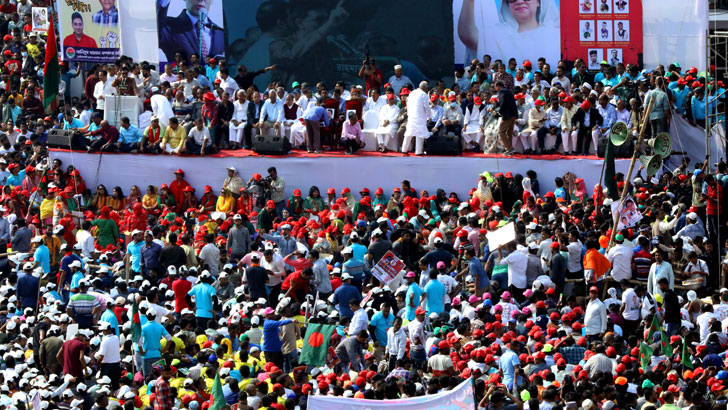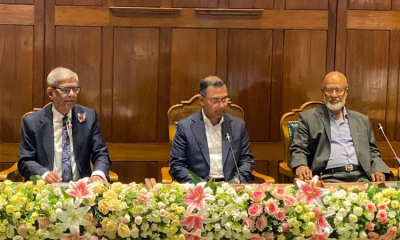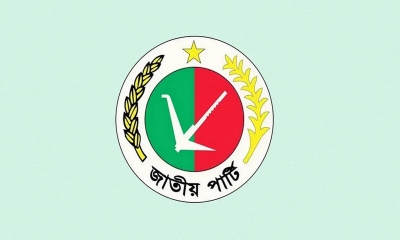Plans for turning a proposed central rally in Dhaka on December 10 have failed to provide expected dividends to the Bangladesh Nationalist Party (BNP) and its Islamist allies, according to India Today. The BNP leaders had said they would use the rally to announce a "government from the streets" to oust the Awami League government with a record turnout.
But the turnout at the rally was poor — as drone footage by television channels exposed empty spaces with the venue of the rally pouring cold water into the BNP top brass’s tall boast of drawing a million people to the rally.
"When compared with PM Sheikh Hasina's recent rallies in the port city of Chittagong or the seaside resort town of Cox's Bazar, this BNP rally in Dhaka was a very poor one," said a top police official.
While the BNP had said it would launch a nationwide agitation from the Dhaka rally, they ended up just announcing the resignation of their lawmakers in Parliament.
All seven of the BNP's representatives in parliament are quitting their roles as lawmakers. The MPs, Md Zahidur Rahman, Md Mosharof Hosen, Gulam Mohammad Siraj, Md Aminul Islam, Md Harunur Rashid, Abdus Sattar Bhuiyan and Rumeen Farhana, have sent their resignation letters on acting party chief Tarique Rahman's orders.
Just like its previous claims, the party's top brass announced plans to go ahead with their movement to unseat their rival Sheikh Hasina government in Bangladesh.
BNP has announced 10-point demands, including the resignation of the ruling government and the dissolution of the current national parliament.
BNP Standing Committee member Khandaker Mosharraf Hossain announced the points from the BNP's Dhaka divisional mass meeting at Golapbag Ground in Dhaka.
Hossain said all the points has been decided after discussing with BNP's ally parties and all affiliated organisation of the party.
BNP's demands
1. Resignation of the ruling government by dissolving the current national parliament.
2. Formation of a neutral caretaker government/interim caretaker government in line with sections Kha, Ga and Gha of article 58 of the constitution that was in place in 1996.
3. The caretaker government must form a neutral Election Commission that will ensure a level-playing field for all parties, the use of EVMs and party symbols in local government elections will be annulled.
4. Convictions of all the opposition leaders and activists, including Khaleda Zia, journalists and religious scholars will have to be scrapped and all "false cases" filed against them should be withdrawn, freedom of speech should be ensured, autocratically arresting opposition party leader and activists should be abolished.
5. All the black laws, including the Digital Security Act, 2018, Anti-Terrorism Act, 2009 and the Special Powers Act, 1974 must be revoked.
6. The anti-people decisions to increase the price of public services, including electricity, energy, gas and water need to be cancelled.
7. Bringing the price of essential commodities within the affordability of general people and de-syndicate the market of essential commodities.
8. All the victims of enforced disappearances in the last 15 years should be rescued and those responsible for extrajudicial killings must be identified and punished.
9. A commission must be formed to identify the corruption in banking and energy sectors and share market in the last 15 years.
10. Law enforcement, administration and judiciary's function to be independent without government interference.
On December 7, one person was killed as around 50 were injured as BNP activists and police clashed in the capital's Nayapaltan. Amid a barrage of cocktail explosions hurled by party carders, targeting law enforcers. In retaliation, tear shells and rubber bullets were fired by police.
Moreover, the much anticipated appearance of its ailing leader Begum Zia, convicted of money embezzlement from orphanage fund and virtual participation of its acting chairman Tarique Rahma in the rally also did not happen.
"From an aggressive pitch to bring down the government, it ended up in a whimper of protest," said women activist Shahnaz Parvin.
The choice of the date was to link the agitation for regime change in Dhaka to World Human Rights Day. The BNP has drawn much sustenance from the weaponisation of human rights. Even the reports by UN groups on enforced disappearances and extra-judicial killings had gone a long way to promote a narrative that the Awami League was destroying democracy in Bangladesh and thus all means, fair and foul, was legitimate to bring it down.
BNP Secretary General Mirza Fakhrul had admitted in media interviews that the US sanctions against some senior officials of the Rapid Action Battalion (RAB), including former police chief Benazir Ahmed, had greatly energised BNP's phased agitation that began with district rallies and was to culminate in Dhaka on Dec 10.
The BNP lobbyists had expected the US may issue sanctions against few more Bangladesh police and security officials to deter the top echelons of Hasina government from resorting to tough policing to neutralise the Opposition agitation.
Now the BNP made the first mistake over the venue of the Dhaka rally. They refused to organise it at Suhrawardy Udyan, the natural choice for any party to hold a massive rally in Dhaka, and sought to organise it in front of party headquarters at Naya Paltan.
"No administration will allow a rally in a central business district," said a police official.
When the police appeared determined not to allow the rally at Naya Paltan, the BNP leadership in Dhaka backed off and finally agreed to hold it at Golap Bagh, amidst speculation that it was pushing from a venue with a smaller holding capacity because it was not sure of filling up the Suhrawardy Udyan.
Failure to do so would undermine BNP's tall claims of leading a popular agitation, specially after Sheikh Hasina's huge rallies in Chittagong and Cox's Bazar.
The second big setback for the BNP was the US State Department's announcement on the night before the December 10 rally.
It said, "Today the U.S. Department of the Treasury’s Office of Foreign Assets Control (OFAC), in recognition of International Anti-Corruption Day and Human Rights Day, is sanctioning a diverse array of over 40 individuals and entities that are connected to corruption or human rights abuse across nine countries.
"Over the course of 2022, Treasury took numerous actions to promote accountability for human rights abusers and corrupt actors across the world, including sanctions on dozens of individuals and entities including in the Western Balkans, Belarus, Liberia, Guatemala, the Russian Federation, Burma, and Iran. Treasury utilized various tools and authorities — including Executive Order (E.O.) 13818, which builds upon and implements the Global Magnitsky Human Rights Accountability Act — to demonstrate the U.S. government’s focus on promoting respect for human rights and countering corruption.
“Corrupt actors and human rights abusers both rely on deficiencies in the international financial system to perpetrate their activities,” said Under Secretary of the Treasury for Terrorism and Financial Intelligence Brian E. Nelson. “Over the past year, Treasury has made combatting corruption and serious human rights abuse a top priority, including through the use of financial sanctions and addressing vulnerabilities in the U.S. and international financial systems. By exposing the egregious behavior of these actors, we can help disrupt their activities, dismantle their networks, and starve them of resources.”
The State Department press note said the "United States is committed to taking actions consistent with its values and recognizes that respect for human rights is a prerequisite for global peace, security, and prosperity."
It also said that "today's actions are also a key component of the Biden-Harris Administration’s efforts to implement the first-ever U.S. Strategy for Countering Corruption, released in December 2021. The treasury is working diligently to implement other elements of the strategy, including efforts to curb illicit finance related to corruption.
For example, as part of the Treasury’s ongoing work implementing the Corporate Transparency Act, the Financial Crimes Enforcement Network (FinCEN) issued in September 2022 a final rule on beneficial ownership information reporting requirements, which will help stop corrupt actors and other criminals from using anonymous shell companies to hide their ill-gotten gains. "
The setback for the BNP and its Islamist allies is that though scores of entities across the world have suffered US sanctions, there was not a single one from Bangladesh. For weeks, BNP lobbyists were quietly circulating lists in social media or outlets close to them of several police and para-military officials in Bangladesh who would be slapped with sanctions.
Topping the list was the police intelligence chief Monirul Islam, a very efficient officer whose role in counterterrorism had been lauded even by FBI officials in the past.
A former BNP press wing officer-turned-party activist, Mushfiq Fazal Ansari, who now attends press briefings regularly in UN and the White House, posted on his Facebook days back about an upcoming sanction, an instance among a litany of how the party activists were trying to look upon foreign power to boost morale of its grassroots.
The whole purpose of this exercise was to scare and demoralize the top brass, so that BNP and its Islamist allies could resume their firebombing and assassination campaign without any counter action.
Now that no single Bangladesh entity has been slapped with sanctions, not only can the government breathe easy and fight street violence with appropriate measures but also the BNP stands out without a force multiplier.
December is Bangladesh's month of victory, the month in 1971 when Bangladesh freedom fighters and their Indian allies crushed the oppressive Pakistani military and liberated Bengalis to create South Asia's youngest nation.
This December, the BNP was trying to script a new narrative for the country by declaring it as the month to start a fight to restore democracy. That narrative has now fallen flat on its face.
“Such a miserable turnout coupled with outright public rejection of the party’s grisly street terror campaign years back clearly put the party in a bind and it seems the party’s biggest mistake is to unleash the call for violence in December, instead of celebrating the month of victory with people," Sufi Farque, an info tech expert-turned-politician said.











-20260217073221.webp)

-20260216115008.webp)



















